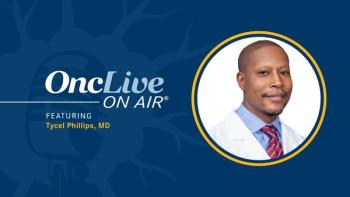
Diagnosis and Prognosis of Follicular Lymphoma
Transcript:Ian W. Flinn, MD, PhD: Hello, and thank you for joining this OncLive Peer Exchange® titled “Follicular Lymphoma: Evolving Treatment Landscape.”
Despite that follicular lymphomas remains a chronic incurable disease, outcomes are good for most patients, with median overall survival exceeding 12 years. Over the last 15 years, treatment approaches have drastically improved patient survival. However, for the subgroup of patients who have high-risk disease and who develop early relapse or histological transformation, clinical outcomes after immunochemotherapy are still poor.
Today I’m joined by a group of my colleagues who are renowned experts in the field of lymphomas research. We will discuss evolving research surrounding the treatment of follicular lymphoma. We’ll talk about how to incorporate newly available agents into our treatment approaches, and we’ll highlight the studies from the 2018 ASH [American Society of Hematology] annual meeting.
I’m Dr Ian Flinn, and I am the director of the Blood Cancer Research Program at Sarah Cannon Research Institute in Nashville, Tennessee.
Participating today our distinguished panel are:
Dr Nathan Fowler, associate professor in the Division of Lymphoma and Myeloma in the Division of Cancer Medicine at The University of Texas MD Anderson Cancer Center in Houston.
Dr Ajay Gopal, professor of medicine, Division of Medical Oncology at the University of Washington School of Medicine and member of the Clinical Research Division of the Fred Hutchinson Cancer Research Center in Seattle.
Dr Scott Huntington, assistant professor, Section of Hematology, Department of Internal Medicine at Yale University School of Medicine in New Haven, Connecticut.
Thank you so much for joining us, let’s begin.
So, Nathan, let’s start off by discussing follicular lymphoma, indolent lymphoma, and how they differ from more aggressive lymphomas.
Nathan H. Fowler, MD: Sure. The good news is with follicular lymphoma the outcomes have been improving for quite some time and now we see the overall survival with a lot of patients, well actually the majority of patients with follicular lymphoma, reaching in the decades. And this is really a reflection of disease process along with some of the new therapy that’s emerging.
Most patients that are diagnosed with low-grade lymphoma, they present with very often, again, slow-growing disease. Many times they’re asymptomatic. And we now can put them into different groups often reflecting their different treatment options. For example, with follicular lymphoma we often separate them into grade 1, grade 2, grade 3. And the higher the grade, the more aggressive cells are in a sample. We also know that we can subdivide other indolent lymphomas into different subtypes of marginal zone and others. And why that’s really relevant is that some of the treatment options that are emerging often work better in some of these different classes of low-grade lymphomas and in follicular lymphoma.
We know that follicular lymphoma is driven by this hallmark BCL2 mutation. But unfortunately, as we’ve talked about, in many different settings targeting that mutation is often not sufficient. We now know that the mutational profile in follicular lymphoma is very heterogeneous, not only across the disease but even within different patients that have the same disease. Some of these mutations code for epigenetic factors like CREB-BP [binding protein] and EZH2. I think we’re now learning that follicular lymphoma is probably much more complex than we initially thought. And there is not just this one driver like BCL2 that is kind of controlling the disease, but there are probably multiple things that are happening that impact how the disease progresses and how it impacts changes within the microenvironment.
Ian W. Flinn, MD, PhD: We know that the lymphoma transforms. Can we predict that, or what’s driving that transformation?
Nathan H. Fowler, MD: The short answer is, no. And we’ve looked at several different clinical factors, the grade of the disease; for example, LDH [lactate dehydrogenase]. But as a rule we don’t really have a good test when patients come into the clinic to predict who was going to transform. There have been some retrospective studies that suggest that rituximab exposure, as part of the first-line treatment, can reduce that risk. And the good news is that, there have been some studies recently, one of them published by the Italians last year, that suggest that the risk of transformation is going down.
And in these Italian papers the lifetime risk of confirmed transformation was only about 10%, which is a lot lower than what we used to be trained. Maybe we’re better doctors, but I think that therapy is impacting the risk of transformation.
Transcript Edited for Clarity




































